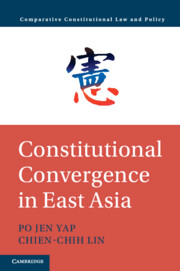Book contents
- Constitutional Convergence in East Asia
- Comparative Constitutional Law and Policy
- Constitutional Convergence in East Asia
- Copyright page
- Contents
- Foreword
- Acknowledgements
- Abbreviations
- 1 Introduction
- 2 Reasons for Convergence
- 3 Convergence on Structured Proportionality
- 4 Convergence on Innovative Constitutional Remedies
- 5 Limits on Convergence
- 6 Conclusion
- Bibliography
- Index
3 - Convergence on Structured Proportionality
Published online by Cambridge University Press: 18 November 2021
- Constitutional Convergence in East Asia
- Comparative Constitutional Law and Policy
- Constitutional Convergence in East Asia
- Copyright page
- Contents
- Foreword
- Acknowledgements
- Abbreviations
- 1 Introduction
- 2 Reasons for Convergence
- 3 Convergence on Structured Proportionality
- 4 Convergence on Innovative Constitutional Remedies
- 5 Limits on Convergence
- 6 Conclusion
- Bibliography
- Index
Summary
Taiwan, South Korea, and Hong Kong are exceptional insofar as their courts are the only ones in Asia that have converged on the use of Structured Proportionality (SP) to invalidate legislation routinely. Their judges reason through the four-stage SP sequentially and harness SP to overturn state action regularly. In East Asia, SP has been used to invalidate laws that limit free speech, freedom of assembly, criminal due process, prisoners’ rights, the right to work, sexual autonomy and the right to property.
Keywords
- Type
- Chapter
- Information
- Constitutional Convergence in East Asia , pp. 62 - 109Publisher: Cambridge University PressPrint publication year: 2021

